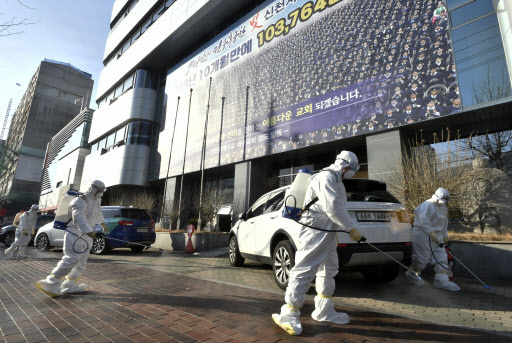The novel coronavirus was apparently brought into the country from Wuhan, China. But it was a branch of an enigmatic Christian sect in Daegu that provided it with a breeding ground at home.
The Shincheonji Church of Jesus, which operates under a veil of secrecy, abruptly came to the center of attention after one of its congregants tested positive for the virus Feb. 18.
The case of the 61-year-old woman, known as COVID-19 patient No. 31, was linked to many others among followers who attended the same Sunday service at the Daegu branch in February.
Since then, Shincheonji has come under attack from all sides -- from the public, politicians and municipalities to mainstream Protestant churches that have denounced it as a cult.
A petition uploaded to the presidential office’s website calling for the forcible dissolution of the religious sect had gathered more than 1.2 million signatures as of Monday morning.
In a survey by Realmeter, more than 86 percent of respondents said they wanted a search and seizure operation on the Shincheonji Church of Jesus.
Behind the public anger lie the sect’s covert practices, which are seen as jeopardizing the government’s efforts to contain the virus -- from its leadership’s failure to provide a full list of the Shincheonji membership to some of its followers’ refusal to be tested.
Panicked by a rapid rise in cases linked to patient No. 31, health authorities tried to secure a membership list for the Shincheonji Church of Jesus -- first from the Daegu branch -- to get members tested for the virus.
But cases continued to emerge in other cities and provinces among those who attended Sunday services at the branch in Daegu, leading the government to conduct testing on some 310,000 followers nationwide.
Municipal leaders were quick to join the bandwagon in taking action against the Shincheonji.
The Seoul Metropolitan Government and other local governments quickly shut down all Shincheonji-related facilities under their jurisdictions for quarantine and conducted epidemiological studies.
They accused the Shincheonji leadership of deliberately withholding information about its membership, citing discrepancies. Some followers were out of reach and others refused to follow the government’s quarantine measures, they said.
The Shincheonji Church of Jesus has denied all the accusations about its alleged uncooperative attitude, complaining of a “witch hunt.”
Now, the founder of the religious sect, Lee Man-hee, is facing criminal charges including murder through willful negligence for putting so many lives at risk and playing a role in the rapid spread of COVID-19.
The church itself might also be at risk of being dissolved.
The Seoul Metropolitan Government on Monday carried out an on-site inspection into the Seoul branch of the Shincheonji Church to obtain documents and materials necessary for quarantine measures.
If any violations of law are found in the operation of the Seoul branch, the municipality said the materials would provide legal grounds to revoke the church’s business license.
The Shincheonji shot back on Monday, saying their rights to practice their religion are guaranteed under the Constitution and the law.
“We are making efforts with a sense of great responsibility for causing concerns to the public over the coronavirus, but we are opposing the coronavirus outbreak being used as a political tool,” it said in a statement.
The public anger is far from dying down despite the apology from the religious sect’s leader, Lee Man-hee, who claims to be a prophet of Christ.
Lee initially said the epidemic resulted from “the evil who wants to stop the rapid growth” in a letter to the sect’s followers before he apologized to the public and called it a “great calamity” at a news conference last week.
The sect offered a donation worth 12 billion won to help with the government’s containment efforts, only to have it rejected.
The Shincheonji Church of Jesus expressed regret and said it had decided to take back the money.
On Sunday, Shincheonji’s Daegu branch sent out a notice to its followers saying those who are not cooperating with the authorities are banned from attending worship services at the church.
Making Shincheonji the target of criticism for hampering the government’s containment efforts is one thing, but stigmatizing the whole group is another, experts say.
“It is legally possible to revoke the business license of an organization if it caused harm to the public good. If that’s the case, it is not a dissolution of the organization, but revocation of its registered business,” said Han Sang-hie, a professor at Konkuk University Law School.
“But the decision should not be based on prejudice against the Shincheonji Church. It is also an organization that has the right to freedom of religion.
Founded in 1984 by Lee Man-hee, Shincheonji is also known for its avid and covert missionary work in local communities, recruiting potential followers at cafes or other churches without revealing their identities or intentions.
During Sunday services, Shincheonji followers allegedly sit close to each other on the floor and shout “Amen” loudly, with their prayer sessions involving close physical contact, such as putting their arms around each other’s shoulders, which critics say might have caused the rapid transmission of the virus among the sect’s followers.
As of Monday, nearly 63 percent of the country’s total coronavirus cases, or 4,482, are linked to Shincheonji, making it the single largest cluster in South Korea.
(
laeticia.ock@heraldcorp.com)







![[Today’s K-pop] Blackpink’s Jennie, Lisa invited to Coachella as solo acts](http://res.heraldm.com/phpwas/restmb_idxmake.php?idx=644&simg=/content/image/2024/11/21/20241121050099_0.jpg)
